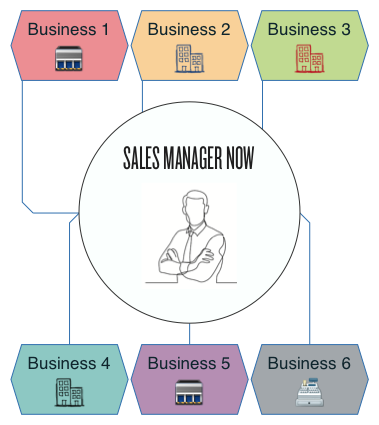Exploring Fractional Sales Leadership If your business has made it past the ten-year mark, it…
Managing Sales Responsibilities Is Not Optional
I recently heard a speaker say that a lot of people are crazy busy. As salespeople, with all the “busy” around sales responsibilities, it does get “crazy” and managing it can be a struggle. We either let fear get in the way, or we lack the skill to prioritize, or we don’t have a proper system in place to manage our time. In sales, we can’t afford to be poor time managers and or fall behind on our sales responsibilities. Period.
Address your Fear
Fear is a roadblock to moving forward in managing the sales process and all it entails. We all have fears – fear of failure, fear of not knowing what to do, fear of consequences (good or bad) or fear of being judged. Those are a few. First and foremost, if fear is your biggest hurdle to managing time around sales activities and customer projects, take an immediate step to address that. Identify that fear and write it down. Talk to your boss or a trusted advisor. Do something to address your fear.
Learn how to Prioritize
Another roadblock may be not prioritizing your “full plate”. Knowing what goes at the top of the “to do” list every day is imperative. We often do things we like to do or are comfortable doing versus things we need to do. We may have a difficult time clearly judging the difference between something that is important versus something that is urgent. Early in my career, I attended a time management course, and one rule really stuck with me – know the difference between “important” and “urgent”. The trainer explained, “When your house needs to be painted – that’s important. When your house is on fire – that’s urgent.” For example, getting to know a customer – that’s important. Completing a proposal for a new customer for tomorrow morning’s meeting – that’s urgent.
Learning the difference between must do’s and want to do’s will improve your ability to manage your sales responsibilities. Each day make a “must do” list. Keep it short and realistic. You must do those must do’s. Your efforts that day must be dedicated to completing that list. And you must schedule a time to do this.
Time blocking can help. Each day take fifteen minutes to plan the days must do’s and want to do’s. Each week schedule a day to plan for the weeks and months ahead. For example, block each morning at 7:45 for day planning and Thursday afternoons for long-term planning. Don’t take calls and don’t schedule meetings during these times. If a call comes in or a meeting gets scheduled, if it’s urgent – then take it, if it’s important – call back or reschedule.
If you are challenged with prioritizing, commit to developing or improving this skill. Consider attending a Time Management course or so some reading. Stephen Covey’s, Seven Habits of Highly Effective People is one that will address prioritization as well as other time tested effective habits.
Use a System
In sales, it is almost common-place today to have some type of CRM system to manage your accounts. But even with a CRM system, if it isn’t being utilized to optimize your sales responsibilities, it has limited value. You must take the initiative, embrace discipline and develop the skill of managing a full plate within a system. We’re all different and if you need help, talk it over with someone and address it. But, pick one system and commit to using it.
If your sales responsibilities are suffering due to your struggle with all that is on your plate, remember to work on these simple and critical steps to get yourself back on track.
– If you are stuck due to fear, find someone to help you address that fear.
– Learn to prioritize what you need to be doing to be effective and to be accountable to your role.
– Utilize a system to manage your workload and commit to a disciplined habit.
It is a developed and learned skill to manage your time, whether in your sales career or your personal life. If you struggle with it, make the time to address it today!





Comments (0)